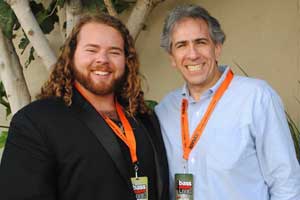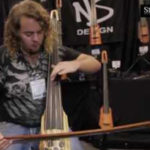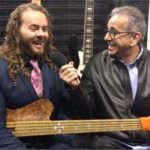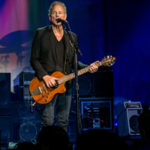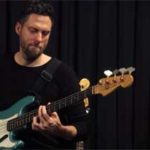Hot, young up-and-comer says bass is “not a background instrument”
By Mindy Rochwerg
December 3, 2014
Twenty-four year old Chance Wilder Onody is starting to get noticed, and deservedly so. Primarily self-taught, Onody, has been described as a “virtuoso bassist” and “classical crossover instrumentalist.” Chance recently sat down with FBPO’s Jon Liebman to talk about his musical upbringing, unique style and what lies ahead.
Onody, whose mother, Tara Wilder, was a country pop artist, first took up the bass when he moved with his family from British Columbia, Canada, to California. Upon transferring to his new school, Chance had the choice of two electives – Orchestra and Introduction to Marine Biology. Not wanting to have more homework than necessary, Onody (pronounced “ON-ID-DEE”) chose orchestra, though was quickly surprised to find out that the “stringed instruments” in the course description did not include guitar. When advised so by the musical director, Chance took a look at the instruments, saw the bass and said to himself, “It’s big, I’m big, it only has four strings – how hard can it be?”
With no prior experience other than some piano lessons and having played ukulele for a short time, Chance, who says he has a “keen sense of pitch,” told the musical director he could play the upright bass and proceeded to intently watch the other bass player in the orchestra. From that limited exposure, Onody was able to pick up enough to play the new instrument with the rest of the orchestra, even though he had never before held a bow. He says he “fell in love with the instrument.”
Onody eventually played for the Irvine Young Concert Artists, where he learned to play parts originally written for violin. That experience led to him being featured as a soloist.
At 13, Onody got his first electric bass – a “sea foam greenish Fender, with blue pick guard” – which he still has today. He noticed he could really do his “hand stretches” and his “weird stuff” on the electric, it being smaller than the upright. At that point, he started asking people, “Who are the really great bass players?” That’s when he discovered Marcus Miller and Victor Wooten, two key influences in Onody’s playing.
Onody tells Liebman, Wooten “has such good touch and feel. It’s not just chops and moving fast; it’s the emotion that he puts into each note when he plays. Even if it’s a hundred notes going by, you feel the notes. It sounds good. It reminds me of classical music because that’s how classical musicians play. It was like each note is very well thought out.”
Onody mastered the double thumb technique, partly by listening to Wooten and partly by accident. He couldn’t understand what he was hearing or how Wooten was getting that sound. To him it wasn’t slap anymore. It was “like a flamenco kind of sound.” Onody practiced and practiced, but couldn’t reproduce the sound. Dejected to the point of wanting to give up, he threw his arm against the instrument in frustration. That’s when his “thumb hit the string, went through, hit the bass, and made my hand recoil back.” The proverbial light bulb went on.
In addition to Miller and Wooten, Chance sites the legendary Jaco Pastorius as another influence. “Jaco really interested me a lot,” says Chance. “His harmonics are what really got me.”
As he becomes more seasoned as a musician, Onody finds what he really likes is “taking these classical repertoires, moving them around, and putting them on an electric bass or taking these piano pieces and putting ‘em on electric bass.” A consummate doubler, Chance’s love for the upright bass is still as strong as ever. In 2008, Onody toured with the Seoul Philharmonic as part of the Olympic tour, where he soloed in each of the cities on the tour and performed for the Olympic dignitaries. In 2011, he performed with the Hong Kong Chamber Orchestra.
These days Onody is moving into what he calls “the bigger contemporary market.” Though he finds himself playing more upright bass than electric, his recently released a song, “Feeling Good,” features multiple electric basses.
“I believe the bass needs to have this bigger voice,” he says, “by showcasing an instrument that can sound like nineteen or twenty people on stage. It sounds like you’re actually listening to other instruments. It tricks you into thinking there’s horns in certain spots. It sounds like a guitar. It’s not. It’s all bass and on that song I used five basses to accomplish this.”
In addition to doing gigs on his own, Onody is recording a new album with a band called Chris Gerolmo and g.o.d. Onody says the “g.o.d.” is “open to interpretation.” The band features Gerolmo on vocals and acoustic guitar, Doane Perry (Jethro Tull) on drums, Onody on upright and electric bass, Paul Jr. Garrison (Rickie Lee Jones) on guitar and Dr. David Baron on keyboards.
Onody plays the NS Design CR4M Upright bass with a piezo bridge. He says since the instrument has magnetic EMG pickups, he can “go full magnetic” if he wants to “or blend them and get a cool fretless sound on a 41 ¾” scale bass.” He adds, “There is a fretless sound that you just can’t get out of other fretlesses because the string just doesn’t move enough.”
Onody, who is a bona fide NS Design artist, calls Ned Steinberger “this evil genius of sound.” He says he plays Steinberger’s instruments because he can “manipulate this transparent sound to sound like an upright – like an actual upright – and they are the only, the only instruments, in my personal opinion that sound exceptionally good with the bow. Not just okay, they sound good!” Onody cannot say enough great things about the company either, like how they believe in him and how he is trying to “bridge the gap between classical, jazz and contemporary ‘pop-ish’ kind of music. To bring the bass more to the forefront in all these different avenues.” He adds, “I love their products. There’s a new Omni Bass which is really, really cool, too.” In addition to his prized NS Design instruments, Onody is currently using a Warrior Dran Michael Isabella custom electric bass.
In the future, Onody sees himself writing his own music and soloing. “I like being a soloist. I like making my own rules writing my own music. There’s a voice I can create to express who I am and what I’m going through and how to share it with the world.”
As for the bass, Chance feels strongly that, “this instrument is not a background instrument. It has every right to be up front.” I truly plan on bringing it to the forefront, doing multiple orchestrations of me playing all the parts, including the melody, and then devising a way of actually being able to do that live.”
